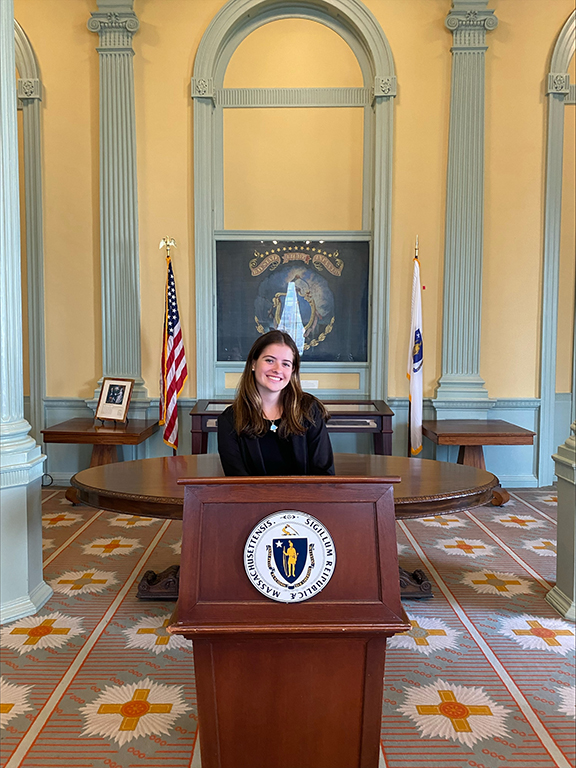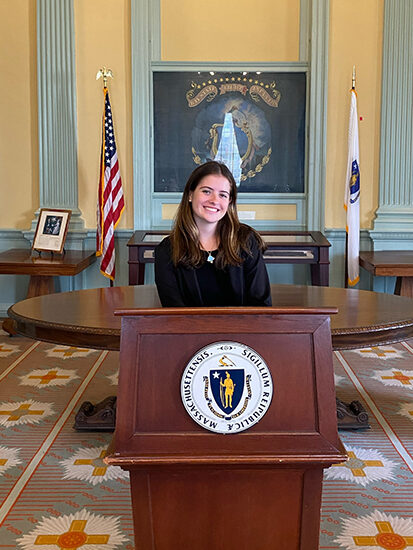
Rylee Anderson | Staff Writer | randerson5@mail.smcvt.edu

You’ve probably been hearing about internships since you were in high school, and now that you’re in college and trying to establish a career, you’re being pushed more than ever to find one. Summer break is just one opportunity for students to gain experience with an internship.
“Internships are crucial,” said Aisling Fantasia, a senior business major who has completed three internships during her time at St. Michael’s. “I can’t even imagine not having any internships. If you go in with no internship experience, it’s gonna be 10 times as hard to get a job.”
According to a survey by the National Association of Colleges and Employers (NACE), 62% of 2023 graduating seniors took part in an internship. The survey also showed that those who took part in an internship were paid higher median salaries after they graduated than those who did not.
Internships can allow you to gain professional experience. They can also allow you to gain academic credit when taken alongside an internship practicum. “Having both academic experience, as well as practical work experience, that’s what employers want to see. Anyone and everyone should do an internship,” said Ingrid Peterson, a career education coach and director of the Career Education Center.
It may seem overwhelming, but there are plenty of resources on and off campus to help you snag the perfect summer internship. The Boucher Career Education Center, in the Student Success Center, is one place to go if you’re in search of internship help.
“The critical thing is doing it in a timely manner because internships close very fast,” said Dina Alsaffar, St. Michael’s internship and peer tutoring coordinator. “Come to us early, even if you’re not even thinking about jobs or graduation.” Typically, students should consider searching for internships up to a semester before it takes place, but not all hope is lost if you’re just starting to think about it. Here are some steps to get you started.
Find an Internship:
Online resources like Handshake and LinkedIn can help you find internships, whether you want to work in Vermont or your hometown. Another way to find internships is through networking.
Peterson said networking isn’t as mysterious as it seems. “When you want to network with someone, you should set goals for yourself,” she said. “What is your goal? Break it down and figure out, ‘what do I want to get out of this, and what questions do I need to ask to get me closer to it?’”
Networking doesn’t need to involve a stranger. Chances are, you already know someone who might be able to help. “If students are going back home and they have connections with former employers, schools, hospitals, or non-profits, they can work with them to find or even create an internship opportunity as opposed to waiting for something to pop up,” Alsaffar said. “Taking those initiatives is really important for students to do.”
You can also make connections online. “On LinkedIn, you can see when you apply for a job if that company has any alumni or secondary connections. St. Mike’s people are always willing to help,” said Fantasia.
Work on Your Resume and Applications:
“The first step of the process is, ‘how’s your resume?’” Peterson said. “Applying for an internship or a job is the test. Getting all your documents ready – the resume, cover letter, and thinking about interviewing – that’s the studying for the test.”
It’s important to tailor your resume to the internship you are applying for, as that will make your application stronger. Setting up an appointment with a career education coach in your field can be a good place to start. In turn, an internship will look great on your resume when applying to jobs in the future. Fantasia said her internships “helped establish a good foundation” for her resume.
Getting Credit:
Some students might not know you can get academic credit for internships. For some majors it’s a requirement (like Business and Criminology), and for others, it can allow you to get ahead in credits and experience. “One thing to remember is that you can’t get academic credit from doing an internship alone,” Alsaffar said. Once you’ve found an internship, there are several ways to get credit, including taking the 4-credit Internship Practicum, ID 498, which is an online course in the summer. There are other options, so if you’ve got a summer internship lined up and want to get academic credit, or if you have general questions about receiving credit for an internship, make an appointment on Handshake with Alsaffar or visit her in the Student Success Center.
Some internships are paid, however, that’s not always the case. “There are some amazing experiences that unfortunately are not paid,” Peterson said. “We try to get funding so we can support unpaid internships. We also try to help students find internships that are paid.” If you find an unpaid internship, you can still gain academic credit, and there are financial options to go over with the Career Education Center. One possibility is the professional development fund, which can give students more financial freedom while doing any kind of professional development, including an unpaid internship. If you, for instance, need funding for business attire or transportation.
Go get that internship:
It’s never too early to start working on your resume and thinking about internships. You can make an appointment with the Career Education Center on Handshake for more information.
As some last words of advice, Fantasia said, “Stay resilient. You’re gonna get a lot of no’s. It’s nothing personal, it’s super competitive.” Once you do get your internship, make the most of it. “I wish that I asked more questions and did more hands-on stuff,” Fantasia said.
“Make an appointment and get in here ASAP. It’s never too early to have that conversation,” Peterson encourages.

